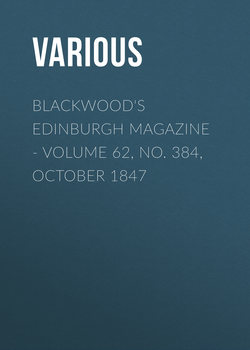Читать книгу Blackwood's Edinburgh Magazine - Volume 62, No. 384, October 1847 - Various - Страница 5
THE VISION OF CAGLIOSTRO AGRIPPA
ОглавлениеIn another instant, the impostor was standing upon the floor of a gigantic amphitheatre in Palestine. The whole air was refulgent with the light of a summer morning, and through the loopholes of the structure, the eye caught the blue shimmer of the Mediterranean. Banners, emblazoned with the ciphers of Rome, fluttered from the walls of the amphitheatre. Its internal circumference was thronged with a vast concourse of citizens; and, immediately about the Rosicrucian, groups of foreign traders, habited as if for some unusual ceremony, were scattered over the arena. Expectation was evinced in every movement of the assemblage, in every murmur that floated round the benches. The worshippers were there, it seemed, and were awaiting the high-priest. That high-priest was approaching, and more than a high-priest; for Herod Agrippa, the tetrarch of Judea had descended from Jerusalem to Cæsarea, for the celebration of warlike games in honour of the Emperor Claudius, and, on the completion of those festivities, the deputed sovereign had consented, at the intercession of Blastus, to receive a deputation of certain Phenician ambassadors who were solicitous for an assurance of his clemency. Those envoys—the merchant princes of Tyre and Sidon—were tarrying in the public theatre of the city for the promised interview in the presence of the people of Samaria.
Cagliostro marvelled, as he scanned the scene before him, whether it were all a reality or a delusion of his fancy; but the lapping of the surge upon the adjacent beach, and the perfume of Oriental spices which impregnated the breezes from the Levant, and even the motes that swarmed about him like phosphoric atoms, proved that it was no juggle of a distempered imagination.
Suddenly the air was rent with acclamations; the crowd rose as if by a single impulse; trumpets sounded in the seven porches of the amphitheatre; again the plaudits shook the air like the concussion of enthusiasm, and the deputation in the arena prostrated themselves in the dust. Balsamo saw, at once, the reason of this rejoicing; he saw the tetrarch of Judea seated upon a throne of ivory. The crown of Agrippa glittered upon his forehead with an unnatural brightness—it was of the purest gold, radiating from the brow in spikes, and flecked with pearls of an uncommon size. Silent—erect—inflated with pride at his own grandeur, and the adulation of the rabble, sate the King of Palestine. Silent—awe-stricken—uncovered before the majesty of the representative of Claudius, stood the people of Samaria and Phenicia. Extreme beauty of an elevated and heroic character shone upon the features of Herod, although his beard was grizzled with the passage of fifty-four winters. In the midst of the silence of the populace, the morning sun rose, almost abruptly, above the topmost arches of the edifice, and darted his beams full upon the glorious garments of Agrippa. It played in sparkles of intense lustre upon the jewels of his diadem; and upon the outer robe, which was of silver tissue woven with consummate skill and powdered with diamonds, the refraction of the sunlight produced an intolerable splendour.13 The Samaritans shielded their eyes from its magnificence; they were dazzled; they were blinded; they thrilled with admiration and astonishment.
Agrippa spoke.
At the first sound of his accents, there was a whisper of awe among the multitude—it increased—it grew louder—it arose to the heavens in one prolonged and jubilant shout of adoration.
"It is a God!" they cried—"it is a God that speaketh, not a man!"
As the language of that impious homage saluted the ears of Herod, his mouth curled with a smile of satisfaction, his soul expanded with an inexpressible tumult of emotions, he drank in the blasphemous flatteries of the rabble, and assumed to himself the power and the dignity of the Most High God. Yet in the very ecstasy of those sensations, his countenance became ghastly, his lips writhed, his eyes beheld with unutterable dismay the omen of his dissolution—the visible phantom of an avenging Nemesis.14 He staggered from his throne, crying aloud in the extremity of his anguish; a sudden corruption had seized upon his body—he was being devoured by worms.
The heart of Cagliostro quailed within him at the lamentations of the people of Samaria, as they beheld their idol smitten down by death in the midst of his surpassing pomp. Even the Jewish hagiographer tells us, with pathetic simplicity, that King Agrippa himself wept at the wailings of the adoring mob.
Again the Alchemist found himself enveloped in darkness, again the unearthly Voice stole into his brain.
"Lo!" it said, "how the frame rots in the ermine: how the body and soul are polluted by vicious passions! Such, Balsamo, are the penalties of the lusts of the flesh."
13
His garb, writes Josephus, "was so resplendent as to spread a horror over those that looked intently upon Him."—Lib. xix. c. 8.
14
"An owl," says Josephus (xix. 8); "an angel of the Lord," αγγελος Κυριου, say the scriptures, (Acts. xii. 23,)—in either case a spectral illusion.
